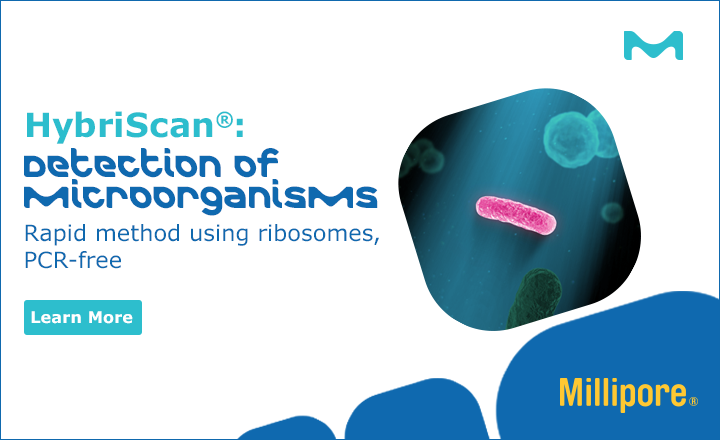The Future of Pharma...
EN ISO 7704:2023 Com...
28th November 2023 Content supplied by: Merck
Easy Non-PCR Molecular Screening for Contaminant Microorganisms
Conventional cultivation-based microbiological methods are time consuming and can take from 2 to 15 days to get results. Although rapid methods such as PCR are much faster, they usually require expensive instrumentation and equipment. Not so the HybriScan® molecular assays.
Our HybriScan® system provides fast and accurate qualitative or quantitative results for a wide spectrum of spoilage organisms and pathogens. It detects attomoles of microbe-specific rRNA using sandwich hybridization. A labelled capture probe is used to immobilize the target sequence on a solid support plate. The digoxigenin-labeled detection probe then provides an enzyme-linked optical signal read-out. Detection of the target results from applying anti-DIG-horseradish peroxidase Fab fragments. The bound complex is visualized by adding horseradish peroxidase substrate. This results is a yellow color that can also be measured at 450 nm using a microplate reader.
Results are available after only about 2 hours of testing. Pre-enrichment can improve sensitivity down to 1 CFU/L. Using the two different specific probes for detection of microbial rRNA minimizes the likelihood of a false positive result.
The main features of HybriScan® molecular screening system:
- Quantitative or qualitative results by organism group or specific species (HybriScan®D kits for quantitative, HybriScan®I kits for qualitative testing)
- Detects living cells only
- Also detects non-culturable microbes
- High specificity
- Not sensitive to sample matrix
- Cost-efficient read-out using a standard plate reader (or visually for qualitative results)
- Results in about 2 hours
- High sample throughput
The microorganisms to test water for include:
- Escherichia coli
- Legionella (in wastewater)
Total Bacterial Count
Wastewater Total Bacterial Count - Legionella pneumophila
- Microthrix parvicella
Due to its insensitivity to sample matrices, the HybriScan® system can also be used to test a wide range of beverages for contaminants, including:
- Typical beer-spoiling organisms
- Various yeasts
- Various lactobacilli
- Alicyclobacillus and Pectinatus frisingensis
Megasphaera cerevisiae
Pediococcus damnosus - Brettanomyces
- Leuconostoc
- Pectinatus cerevisiiphilus
Visit Merck/Millipore Sigma for more or use the Request Information button below to connect directly with the supplier.
Tags:
Date Published: 28th November 2023
Source article link: View
The Future of Pharma QC
EN ISO 7704:2023 Compliant Membranes, Culture



